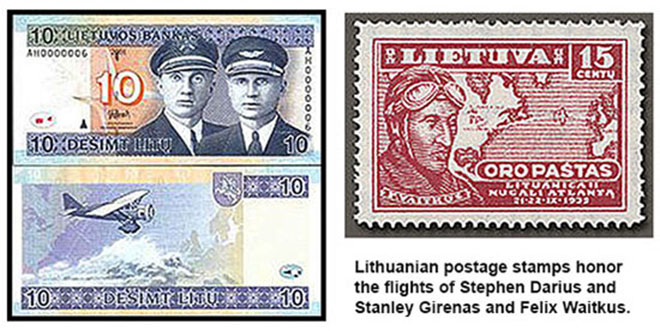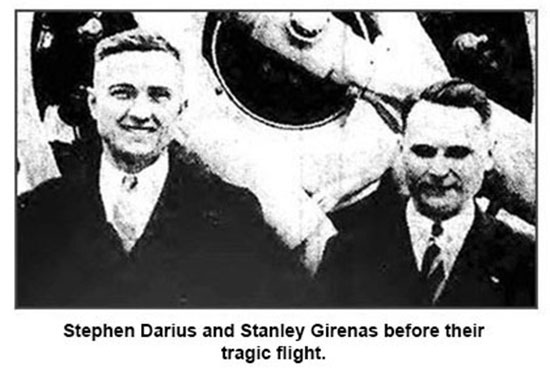New York Evening Post, July 15
Unauthorized pilots take off
for Lithuania
Two veterans of the United States Army in the World War took off at dawn from Floyd Bennett Airport and headed their heavy laden monoplane, Lithuanica, over a 4,900-mile course across the Atlantic Ocean to their native Lithuania without parachutes, radio, passports or government clearance papers.
In addition to the risks of the flight, the plucky fliers face fines for the unauthorized flight, loss of their licenses, and penalties for flight without permission over foreign countries.
Taking advantage of the interest in the take-off an hour earlier of Wiley Post across the ocean, the two pilots warmed their engine for what they declared to be a loading test flight and got away by this ruse on the adventure they had been planning since May 7.
Their trim Bellanca monoplane, powered with a Wright Whirlwind engine of 365 horse power, staggered under the heavy load of fuel and barely managed to lift into the air at the extreme end of the mile-long runway.
Their intentions unknown to airport officials, Captain Stephen Darius, 36, at the controls, and Stanley Thomas Girenas, 37, his companion, were sped on their way with the well wishes of friends, including Paul Zadeikis, Consul General here of Lithuania.
As officials watched the dangerous takeoff with trepidation, fearing the plane would fail to clear the ground before the end of the runway, they saw the plane nose due east over the Atlantic with less than 200 feet of altitude before it disappeared into the low-hanging mists.
Certain death appeared to threaten the men who risked severe penalties for making the unauthorized flight.
Swaying and bumping under the load of full gasoline tanks and extra cans of lubricating oil and fuel, the plane missed destruction several times as it gathered speed over the ground. To those who watched, it seemed that the landing gear surely would fall under the strain.
At length, when the wheels grazed the last inch of the runway, the plane bounced into the air at 6:24 Eastern Daylight Saving Time. Had it failed at this moment, it was the opinion of the experts it would inevitably have crashed and burned.
Major J. Nelson Kelly, field manager, said he had no idea the fliers would attempt to takeoff in view of the government’s refusal to grant a license. He also said the two aviators had failed to sign the airport register.
Aeronautics officials of the Department of Commerce in Washington, according to the Associated Press, today explained that Captain Darius and Girenas had applied two months ago to arrange for papers for their flight.
“As far as their equipment was concerned, it was satisfactory,” said Department of Commerce officials, who also approved the competency of the fliers.
The difficulty arose in the matter of making arrangements to fly over Iceland, Ireland, England, Denmark, Germany and other countries in the projected course.
To obtain the permission of those governments to fly over their territory would require at least sixty days by mail, and the fliers told Department of Commerce officials they would not be able to spend approximately $100 to obtain the permits by cable.
The two pilots are believed to have obtained permits to land in Lithuania. If they reach that country, they will be all right, but if they are forced down in some other country they will be subject to disciplinary action.
A crowd of several hundred persons at the field to see Wiley Post’s take-off less than an hour earlier had lingered and witnessed the start of the second venture in the perils of flight over the ocean.
In addition to 770 gallons of gasoline, weighing more than 5,000 pounds, Darius and Girenas carried little in the big orange and silver-coated monoplane.
Their provisions included a quart of black coffee, two bottles of malted milk tablets, a gallon of drinking water, a roasted chicken, a dozen apples and a dozen oranges. Before these are consumed, they hope to complete a non-stop flight of practically 5,000 miles. If successful, this will come close to the non-stop record.
Captain Darius, born in Tuarege, Lithuania, was brought to the United States when ten. His mother, Mrs. Augustine Degutis, is living in Chicago.
He was tutored in Lithuania, then attended grade school in Elizabeth, New Jersey, and West Pullman Junior High School in Chicago and Harrison Tech and Lane Junior College there.
He enlisted in the First Illinois Field Artillery, later federalized as the 149th Field Artillery, April 12, 1917, six days before the United States declared war. He received a regimental citation for “habitual bravery under fire” and was wounded in the chest by a fragment of high explosive at the Second Battle of the Marne.
For this wound he has received veterans’ compensation and further education at the University of Chicago.
Entering the air corps of Lithuania in 1921, he rose to the rank of captain.
Returning to the United States, he opened in 1928 an aviation school at South Bend, Indiana.
The Lithuanica is the plane he flew during 1929, 1930 and 1931 for a Chicago newspaper. Aided by subscriptions from many Lithuanian-Americans, he bought and rechristened it recently.
Girenas is an orphan whose home is in Chicago. He was born in Upina, Lithuania, came to the United States when seven and went to work in Chicago when he finished grammar school. He is a war veteran and operated an aviation school in Chicago until 1931. |



